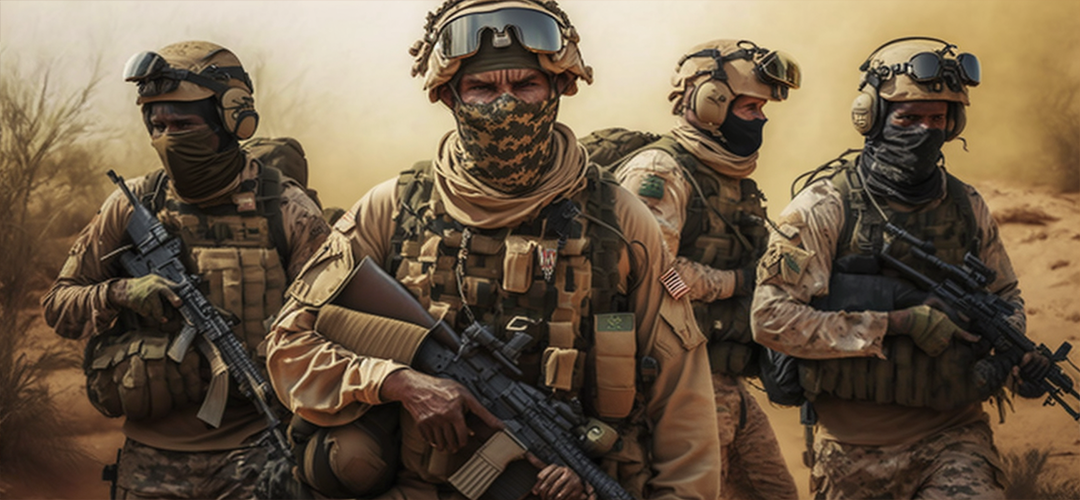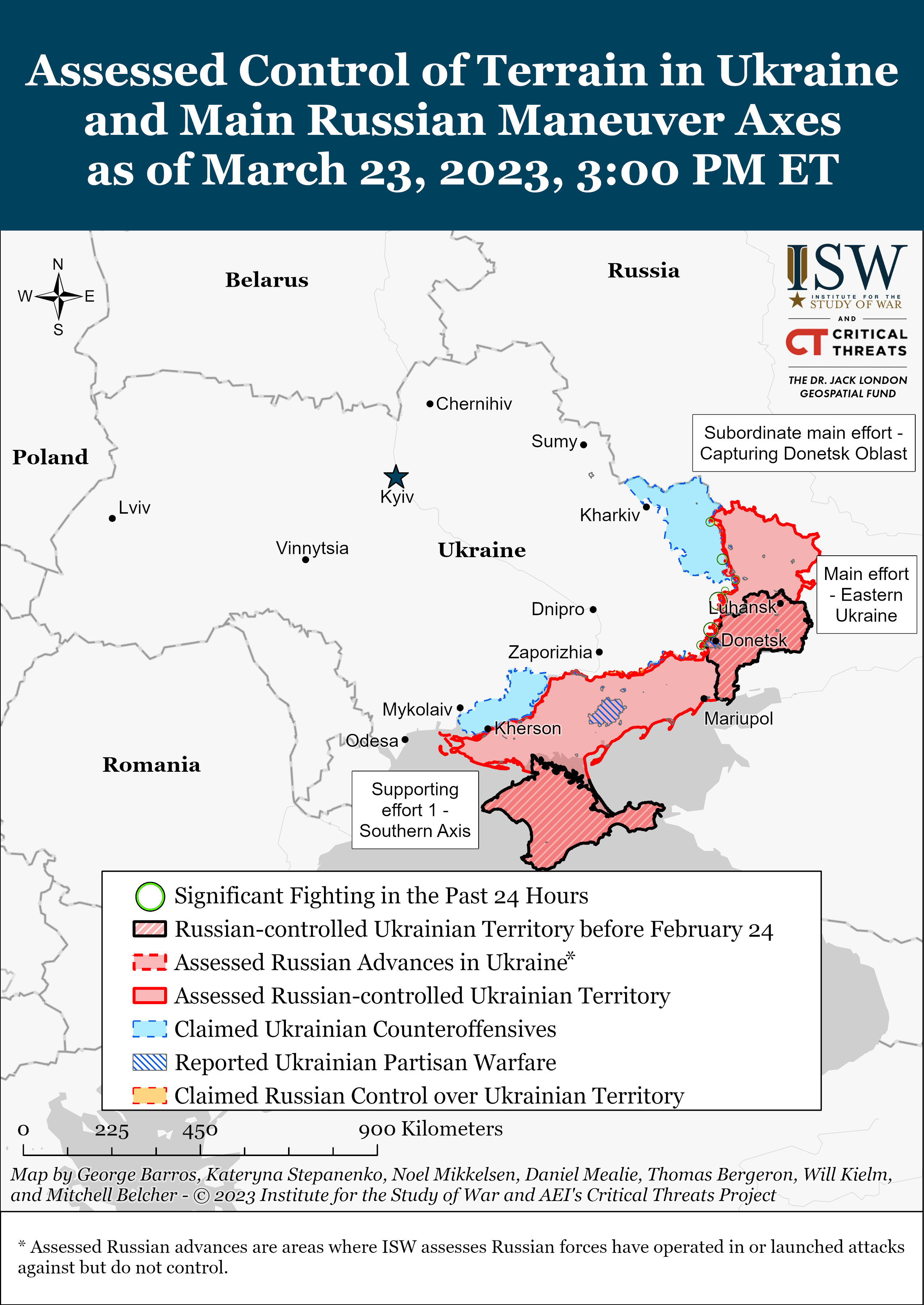Africa: Russians on the Roll?
March 25, 2023 | Expert Insights

For the last decade and more, as publicity-conscious private military contractors (PMC) like the American Blackwaters and South African Executive Outcomes faded away from the collective consciousness, diverting their assets into more discrete ventures, one PMC has grown from strength to strength with every passing year.
The Russian Wagner group, which allegedly has the full blessings of the Kremlin, has taken on its own momentum. In the latest round of fighting in the strategically important city of Bakhmut, the Wagner Group has spearheaded near-suicidal assaults on the Ukrainian defence line, earning hard-earned territorial gains. This has given immense political significance to Wagner's current chief, Yevgeny Prigozhin, also called ‘Putin’s Chef’ by his detractors.
While the Russians continue to flounder in Eastern Europe, caught in a World War I-style battle of attrition, the Wagner Group appears to be furthering Kremlin's interest in the far-flung, poverty-stricken Sahel region with the muzzle of their Kalashnikovs.
Background
As per the influential American Centre for Strategic and International Studies (CSIS), the Wagner Group owes its inception to the failed Slavonic Corps, the first recorded effort made by Russia in raising its own PMC, following the successful Western examples. Registered in Hong Kong in 2013 as the Moran Security Group, this PMC was outsourced to President Assad of Syria, fighting a losing civil war. The Moran failed, and its remnants formed the core of the Slavonic Corps, which helped the Syrian army recapture the oil facilities from the Islamic State. When in 2014, the Slavonic Corps received a drubbing near Deir-al Zour, the surviving members were evacuated home to Russia.
From these battle-hardened veterans, like a phoenix, arose the Wagner Group. As per CSIS, the leading luminary who raised the Wagner Group was one Dimitry Utkin, a former Spetsnaz commander and veteran of both Chechen wars as also the Moran and Slavonic Corps' not-so-successful involvement in Syria. Apparently, the company is named after his radio callsign "Vagner". However, in September last year, The Economist published an article claiming that Yevgeny Prigozhin, a close ally of President Putin, admitted for the first time as being the founder of Wagner.
The Russian annexation of Eastern Ukraine provided an ideal training ground for the Wagner group to fine-tune its organisation, tactics and logistics. Since Russia could not openly use its Army, it used "volunteers' to support a rebellion by pro-Russian groups in the two Russian-majority eastern provinces of Ukraine, Luhansk and Donetsk. The Wagner Group proved to be an ideal organisation to conduct a covert campaign while permitting total deniability to Kremlin. This allowed the Wagner Group to sustain fighting in the eastern provinces of Ukraine for more than eight years.
Wagner operatives come from a mix of backgrounds. While the leaders and trainers are ex-special forces of the Russian Army, the rank and file are a mixed lot. As per Ukrainian media, over 30,000 convicts have been recruited with the promise of a full pardon after a six-month combat tenure in Ukraine. Ukrainian frontline soldiers describe Wagner operatives as 'Zombies' who carry out suicidal frontal attacks against well-entrenched positions.
Wagner group grabbed international attention in Syria, where it is credited with Russian air power for turning the tide in favour of the Assad regime. It was in the battle-devastated moonscape of Eastern Syria that the Wagner operatives' ruthless warfighting was put on display, earning them the respect of other combatants. Not surprisingly, they made their next appearance in a post-Gaddafi Libya, torn apart by internecine warfare, on the sides of warlord Khalifa Haftar, making significant gains and giving Russia a foothold in North Africa and potential access to its rich resources.
Central Africa was the next destination for the Wagner group. They entered into a contract with the Central African Republic in 2018. About 1000 operatives protect the government of Faustin-Achange Touadere and provide muscle for the mining operations in the country for Russian and other investors. The 2021 coup in Mali was the catalyst for their involvement in the Sahel region. Since its erstwhile allies like the French walked out in a huff in protest against the unconstitutional regime change, Col Assimi Goita, head of the ruling junta, saw no reason not to invite the Wagner group to fill in their shoes. By early 2022, the Wagner operatives were in the thick of the battles against the Al Qaeda affiliate JNIM.
It was widely expected that the next state to invite them would be Burkina Faso, which saw two military coups in 2022, resulting in a coup government under Ibrahim Traore. Traore promptly asked French forces to leave, raising speculations that the Wagner group would occupy the vacuum. However, to date, the presence of Wagner operatives has not been confirmed by any independent source. The Russian government has also vehemently denied any involvement in Burkina Faso, although the Wagner boss, Prigozhin has publicly supported the coup leader, Traore.

Analysis
Russia's expanding footprint in Central Africa is largely facilitated by public suspicion of the West, especially their colonial masters, the French. Moscow exploits this anti-France sentiment to the hilt.
Russia is keenly aware of the advances made by China in securing mineral resources in Africa, a well-planned enterprise which has greatly boosted its economic growth and secured critical minerals for its technological advancement. By expanding its footprint on the resource-rich areas of Africa, Moscow wants to profit from the region's rich resources and gain a geopolitical advantage at a time when the West has isolated it in Europe and Asia. It is amply clear that Wagner Group has the blessings of the Russian state at the highest level and has become part of the broader hybrid warfare between Russia and the West.
The military regimes of Central Africa are facing rebellion from a wide variety of opposition militias. They desperately try to hold on to power and have an appalling human rights record. Thus, they can expect no support from the West, and the Wagner Group has no such compulsions.
Obsessed with the war in Ukraine and the fear of an expanding European conflict, the West has given up on this part of Africa. There are few takers for the moralistic foreign policy that the West preaches in the absence of long terms plans backed by military power to inject stability into these war-ravaged nations. Instead, it looks at Africa as a pure mechanistic geopolitical chessboard. This is not going to work. If Western countries want to extend their influence in Africa, they must look at each country individually. They have to analyse in each case how internal conflicts can be stopped in these countries. Right now, the trust factor between Westerners and Africans generally is very low.
Western countries have for long remorselessly exploited the natural resources of Africa. In this respect, what the Russians and, to a certain extent, the Chinese are doing in Africa now is not much different from the actions of western powers.
One factor working to the advantage of Russia and China in Africa is that they do not have a history as colonial powers, which is a huge baggage to carry. It means very limited preconceived notions about Russia and China exist within the larger African population. They can engage with these two powers much more freely. The Russians and Chinese also play up this anti-colonial image of themselves in Africa. Not surprisingly, flag-waving crowds greet Russian operatives when they arrive.
In the case of France, as events in Mali show, anti-colonialism sentiments still play an important role in Africa. France was the wrong choice as a country in assisting Mali in its fight against a domestic Islamist insurgency. The people of Mali have not forgotten about the French colonial period. So, when the French started to criticise the activities of the security forces of Mali, relations between the two countries had to take a downturn. It was very easy for the new military junta in Mali to show its nationalist credentials by going against the French.
Assessment
- Clearly, French withdrawal and the indifference of other Western countries have paved the way for Russia's consolidation in the Sahel. Unless the West reviews its strategy for the region on a country-to-country basis and engages in two-way dialogue with the de facto rulers, they will continue to cede space to Russia and China.
- While western media is flooded with reports of human rights violations carried out by the Wagner group, this has made little impact in countries which have hosted them. It must be understood that the presence of the Russian PMC is not only at the local government's request, but it also has public approval who look at the French as neo-colonists.
- The Russians have simply picked a leaf from the playbook of the West. Since the 1950s, western-backed mercenaries were used by France, Belgium, UK, South Africa and even the U.S. in Africa and Asia to further their interests. Congo is the most glaring example. It is now Russia's turn.








Comments